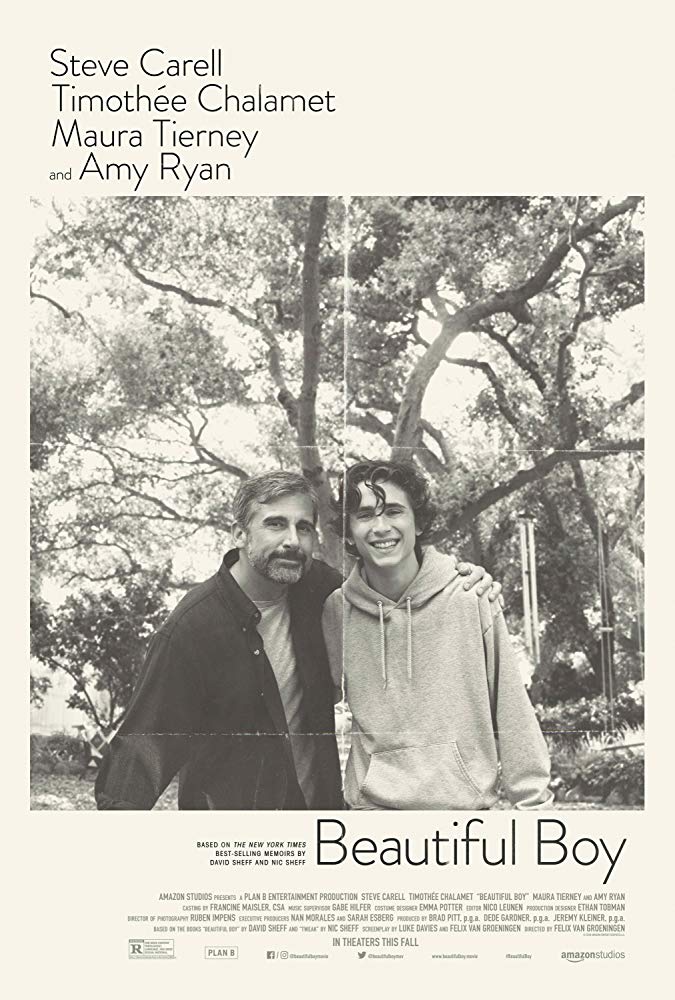Summary:
Based on a pair of best-selling memoirs from father and son David and Nic Sheff. Nic struggled for years with methamphetamine addiction.
My Thoughts:
Over the years, I’ve seen plenty of depictions of drug use in media. Some depictions focus primarily on the immediate or fun effects: the rush of whatever drug it was the user took; the party they attend; the neon lights and warped sounds (there are plenty of movies like this- take your pick: “Spring Breakers”, “Pineapple Express”). Other depictions show drugs use as a sort of journey- an awakening of the senses, a new experience for the mind that will leave it altered (“Enter the Void”, Netflix’s “Maniac”). But out of all of the drug depictions I see in film, the most common depiction is that of addiction and the depravity that comes with it; films that show a person grappling with their own demons and wrestling to survive (“Trainspotting”, “Requiem for a Dream”, “Heaven Knows What”). Films that depict addiction are often harrowing pieces of work that are about as fun to watch as a snuff film, but those films can teach us things. They can act as harbingers to those who might go down that road, or just inform us more about the dangers of that kind of lifestyle.
The problem with this kind of film is that there are quite a few of them, and really, no matter what kind of addiction, no matter what the details of the story, no matter how well acted the movie is, the point of the film really just boils down to one thing. In the immortal words of Mr. Mackey of South Park Elementary: “Drugs are bad, m’kay.” There needs to be something there that elevates the story above what it is about for it to really stick out. “Trainspotting”, “Requiem for a Dream”, and “Heaven Knows What” are movies I would put at the top of the ‘addiction depiction’ movie list. Those films have a strong directorial voice, great characters, and some rather depraved images that really get seared into your skull. I’m of the mindset that, if you want to steer someone away from doing something, you show your characters hitting the bottom of the barrel, and then somehow finding a way to even sink lower. This film is based on a true story, and there were some truly horrible things that happened to the Sheffs, but the director chose to focus on other things, and that, in my opinion, was to the determent of the film.
There were some things that were done very well in this film. Timothee Chalamet (“Call Me By Your Name”) does an absolutely wonderful job portraying Nic Sheff, and Steve Carrell (“Vice”) is decent as David. The story itself is compelling and sad, and I’m sure it mirrors many stories of addiction that are, sadly, becoming more and more prevalent today in our opioid epidemic-ridden society. The problem with the film is that the director wants the viewer to think that every single incident we witness is just as sad as the last, and as a result, there isn’t much in the way of emotional ups and downs. The film starts out sad, continues to be sad for the next two hours, and then ends still sad. I felt exhausted at the end of this movie, but not exhausted because of what I’d seen; exhausted because of the emotions the director wanted me to feel. The director tends to play up every single scene to the point where it almost becomes melodramatic- if it weren’t for the top-notch acting, I would’ve confused this film for a Hallmark channel picture. There were far too many montages of sad things, and weepy-eyed phone conversations, and shots of Steve Carrel sitting in his office starring out at space for me to care anymore.
Lao Tzu speaks about how opposites create one another: being and non-being create one another, he says. When people see things as beautiful, other things become ugly. When things are seen as good others are seen as evil. Dark light. High/low. You could go on and on and on. The point I’m trying to get at is that this film, as it was, was almost entirely sad throughout the whole runtime. If a movie is sad the entire time, it gives us nowhere to go emotionally. We need to see some of the happiest moments of Nic’s life in order to really feel the saddest bits of it. We need to see the best as well as the worst, and instead, this movie chose to focus on the parts that weren’t exactly the best parts of Nic’s life, but they weren’t the worst parts either. As a result, the film feels pretty flat as far as emotion goes. I wanted to feel sad for Nic, but instead I just felt tired, and if I’m being honest, a little bored as the film wore on.
Verdict:
I almost gave this film 3.5/5 Stars because the acting is honestly that good. The problem is both the script and directing are just too static. The director wants us to feel every single emotion without putting in the work for us to do so. The acting is there; the story, underneath the layers of schmaltz, is there; I just don’t know if Felix van Groeningen was the right one to tell this story.
Review Written By:





